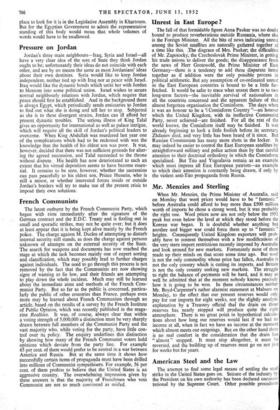Unrest in East Europe?
The fall of that formidable figure Anna Pauker was no doubt bound to produce reverberations outside Rumania, where she is the Foreign Minister. All the bits of news indicating unrest among the Soviet satellites are naturally gathered together at a time like this. The disgrace of Mrs. Pauker; the difficulties of Mr. Zapotocky, the Czechoslovak Prime Minister, in getting his trade unions to deliver the goods; the disappearance from the news of Herr Grotewohl, the Prime Minister of East Germany—there is a tendency to add these disparate items together as if addition were the only possible process in political arithmetic. But any assumption of co-ordinated unrest in the East European countries is bound to be a little far- fetched. It would be safer to trace what unrest there is to two long-term factors—the inevitable .urvival of nationalism in all the countries concerned and the apparent failure of that almost forgotten organisation the Cominform. The days when it was an honour to be a Cominform Country "—an honour which the United Kingdom, with its ineffective Communist Party, never achieved—are finished. For all the rest of the world knows, the Cominform itself may be finished. It was already beginning to look a little foolish before its secretary Zhdanov died, and very little has been heard of it since. But Russian Communism has many more shots in the locker. It may indeed be easier to control the East European satellites by straightforward military and police action than by that careful attention to their doctrinal orthodoxy in which the Cominform specialised. But Tito and Yugoslavia remain as an example which must impress all East European patriots—an example to which their attention is constantly being drawn, if only by the violent anti-Tito propaganda from Russia.


































 Previous page
Previous page